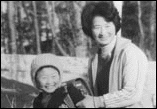|
|
 |
Production Company: "Nao-chan" Production Committee, Deko Kikaku Producer: Otsuki Hideko Director: Ise Shin'ichi Photography: Segawa Jun'ichi Sound Design: Kimura Katsuhide Music: Kimura Katsuhide, Ito Koki Editing: Atsumi Koichi Narrator: Ito Soichi Appearances: Nishimura Nao, Nishimura Nobuko, Nishimura Onori, Nishimura Norikazu, Friends of Nao-chan and Family 1995 / Color / 16mm / 98 min / English Subtitles |
| Director Ise Shin'ichi is the son of the late Ise Chonosuke, a prominent Japanese documentary film editor. After Chonosuke's death and in dedication to him, the film crew started to document the growth of Nao-chan, Chonosuke's granddaughter. The crew included cameraman Segawa Jun'ichi, Chonosuke's contemporary and colleague. They began filming in 1983, when Nao-chan was eight years old. Nao-chan has epilepsy and a serious learning disability. She is enveloped in the warm gazes of her mother and other family members as the camera captures the details of her growing up. The intimacy is made possible by the well-established relationship between the film crew and the family. Because of her cheerful nature, Nao-chan is warmly welcomed by the townspeople, and she eventually brings a great sense of happiness to her mother and the family. But growing up is not all easy. Nao-chan's father, from his male point of view, says that marriage is an impossibility. But her mother's wish is that Nao-chan should marry. Through Nao-chan, the mother develops meaningful relationships with other handicapped children and their mothers, and plays a leading role in the local workshop for handicapped children. This film does not set out to shed light on the hardships and problems that disabled children face in this society, but rather gives us insight into the character of a girl named Nao-chan. Instead of exploring one family's struggles with chronic illness, the film tries to look at the possibilities of a wider world for Nao-chan and other disabled children, as a small park in a residential area becomes a point of contact with the larger society. |